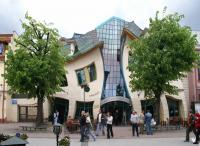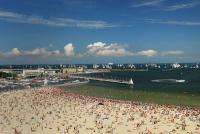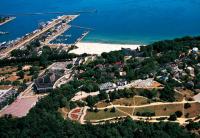Panels
Anniversary Panel Session:
(The Next) 40 Years of Rough Sets
The theory of Rough Sets was founded by Zdzisław Pawlak in order to serve as an efficient framework for data / information / knowledge representation and exploration. Following Professor Pawlak’s seminal paper titled “Rough Sets” published in 1982 in International Journal of Computer and Information Sciences (currently International Journal of Parallel Programming), it is important to discuss the history, the presence, and possible future developments of this theory, as well as its applications. We will emphasize that although the world around us becomes more and more complex - by means of, in particular, growing technological opportunities and big data challenges - there will be always a demand for simple and interpretable solutions.
A special moment of the panel will be devoted to the announcement of the winners of of the PP-RAI’22 contest for the most influential Polish rough set article published in 2020-2021. The panelists and the moderator have carefully examined all 20 submissions to the contest (papers devoted to rough sets or with significant rough-set-related aspects, published in an international scientific journal, co-authored by at least one researcher with at least one Polish affiliation) and will be happy to refer to them during the panel.
Panel moderator: Dominik Ślęzak
Panelists:
- Jan Komorowski (Sweden)
- Witold Pedrycz (Canada)
- Andrzej Skowron (Poland)
- Roman Słowiński (Poland)
Quantum computing aspects of artificial intelligence
Quantum computing is a rapidly developing area of research and engineering aiming at applying the quantum mechanical effects for the purpose of performing computation. Quantum computers work in a fundamentally different way than their classical counterparts and are very likely to be more powerful in some areas of applications. Currently existing quantum computers have very limited capabilities due to imperfections in their implementations. Yet multiple companies invest heavily in their development and a steady progres in the quality of quantum computing platforms can be observed. The cross-section of the fields of artificial intelligence and quantum computing has become its own field of research that is being called quantum artificial intelligence. Two main areas of this field are quantum machine learning and quantum optimization. Quantum machine learning aims at, among others, to apply quantum computers for the purpose of e.g. data classification and quantum optimization deals mainly with combinatorial optimization problems based on so-called Ising models. It is not yet proven that quantum techniques in the artificial intelligence will be of any practical use but a constant stream of new research results allows to be hopeful. During the panel the current state and prospects of quantum artificial intelligence will be discussed.
Panel moderator: prof. dr hab. inż. Halina Kwaśnicka, Wrocław University of Science and Technology
Panelists:
- dr hab. Bartłomiej Gardas, Institute of Theoretical and Applied Informatics, Polish Academy of Sciences
- dr hab. inż. Piotr Gawron, Nicolaus Copernicus Astronomical Center of the Polish Academy of Sciences
- dr hab. Jakub Mielczarek, Jagiellonian University
- dr hab. Marcin Pawłowski, University of Gdańsk
Why do we need graduates in the domain of artificial intelligence?
The dynamic development of artificial intelligence opens both new perspectives for its applications and a huge demand for specialists. The industry needs practitioners first and foremost. Is there a need for Masters? The aim of the panel is to discuss the future of education at the second level of studies (MSc) in the field of artificial intelligence. Some results of the AI Tech project will be discussed. As part of the project, modern study programs are offered and special activities are financially supported for graduates including international internships, study visits, participation in conferences, tutoring and other forms. Are such activities sufficient to attract the best students to graduate studies and train future AI scientists, leaders and innovators?
Panel moderator: prof. Jacek Rumiński, Gdańsk University of Technology
Panelists:
- Prof. Halina Kwaśnicka, Wrocław University of Science and Technology
- Prof. Krzysztof Dyczkowski, Adam Mickiewicz University, Poznań
- Prof. Piotr Szczuko, Gdańsk University of Technology
- Prof. Rafał Scherer, Częstochowa University of Technology
AI trends, challenges and future
AI trends and challenges will be discussed by researchers focused on different hot areas of this scientific field. It is likely that the main threads will be concerned on machine learning, natural language processing, computer vision and robotics, as well as the brain-AI relationships with the question of how far we are from intelligence at the human level. Also, the panelists will question the threats and trust in AI. The discussion on AI must also focus on the prospects of AI applications, including real industrial applications. To sum up, the panelists will try to answer the questions: what is still to be done and do we have a good idea how to do it.
Panel moderator: prof. Włodzisław Duch, Nicolaus Copernicus University in Toruń
Panelists:
- Prof. Janusz Kacprzyk, Polish Academy of Sciences
- Prof. Jacek Mandziuk, Warsaw University of Technology
- Prof. Maciej Piasecki, Wrocław University of Science and Technology
- Prof. Piotr Skrzypczyński, Poznań University of Technology
- Prof. Jerzy Stefanowski, Poznań University of Technology









